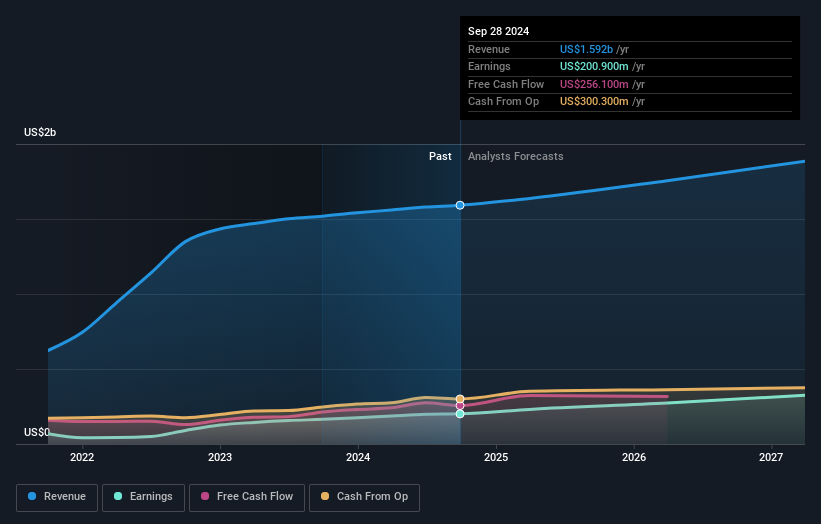- United States
- /
- Machinery
- /
- NYSE:RBC
What Does RBC Bearings Incorporated's (NYSE:RBC) Share Price Indicate?

RBC Bearings Incorporated (NYSE:RBC) saw a significant share price rise of 21% in the past couple of months on the NYSE. The company's trading levels have reached its high for the past year, following the recent bounce in the share price. As a large-cap stock with high coverage by analysts, you could assume any recent changes in the company’s outlook is already priced into the stock. But what if there is still an opportunity to buy? Let’s examine RBC Bearings’s valuation and outlook in more detail to determine if there’s still a bargain opportunity.
View our latest analysis for RBC Bearings
Is RBC Bearings Still Cheap?
RBC Bearings appears to be expensive according to our price multiple model, which makes a comparison between the company's price-to-earnings ratio and the industry average. In this instance, we’ve used the price-to-earnings (PE) ratio given that there is not enough information to reliably forecast the stock’s cash flows. We find that RBC Bearings’s ratio of 52.37x is above its peer average of 24.97x, which suggests the stock is trading at a higher price compared to the Machinery industry. But, is there another opportunity to buy low in the future? Since RBC Bearings’s share price is quite volatile, this could mean it can sink lower (or rise even further) in the future, giving us another chance to invest. This is based on its high beta, which is a good indicator for how much the stock moves relative to the rest of the market.
What does the future of RBC Bearings look like?

Future outlook is an important aspect when you’re looking at buying a stock, especially if you are an investor looking for growth in your portfolio. Buying a great company with a robust outlook at a cheap price is always a good investment, so let’s also take a look at the company's future expectations. RBC Bearings' earnings over the next few years are expected to increase by 49%, indicating a highly optimistic future ahead. This should lead to more robust cash flows, feeding into a higher share value.
What This Means For You
Are you a shareholder? RBC’s optimistic future growth appears to have been factored into the current share price, with shares trading above industry price multiples. However, this brings up another question – is now the right time to sell? If you believe RBC should trade below its current price, selling high and buying it back up again when its price falls towards the industry PE ratio can be profitable. But before you make this decision, take a look at whether its fundamentals have changed.
Are you a potential investor? If you’ve been keeping tabs on RBC for some time, now may not be the best time to enter into the stock. The price has surpassed its industry peers, which means it is likely that there is no more upside from mispricing. However, the optimistic prospect is encouraging for RBC, which means it’s worth diving deeper into other factors in order to take advantage of the next price drop.
So while earnings quality is important, it's equally important to consider the risks facing RBC Bearings at this point in time. Case in point: We've spotted 1 warning sign for RBC Bearings you should be aware of.
If you are no longer interested in RBC Bearings, you can use our free platform to see our list of over 50 other stocks with a high growth potential.
New: AI Stock Screener & Alerts
Our new AI Stock Screener scans the market every day to uncover opportunities.
• Dividend Powerhouses (3%+ Yield)
• Undervalued Small Caps with Insider Buying
• High growth Tech and AI Companies
Or build your own from over 50 metrics.
Have feedback on this article? Concerned about the content? Get in touch with us directly. Alternatively, email editorial-team (at) simplywallst.com.
This article by Simply Wall St is general in nature. We provide commentary based on historical data and analyst forecasts only using an unbiased methodology and our articles are not intended to be financial advice. It does not constitute a recommendation to buy or sell any stock, and does not take account of your objectives, or your financial situation. We aim to bring you long-term focused analysis driven by fundamental data. Note that our analysis may not factor in the latest price-sensitive company announcements or qualitative material. Simply Wall St has no position in any stocks mentioned.
About NYSE:RBC
RBC Bearings
Manufactures and markets engineered precision bearings, components, and systems in the United States and internationally.
Solid track record with adequate balance sheet.
Similar Companies
Market Insights
Community Narratives



